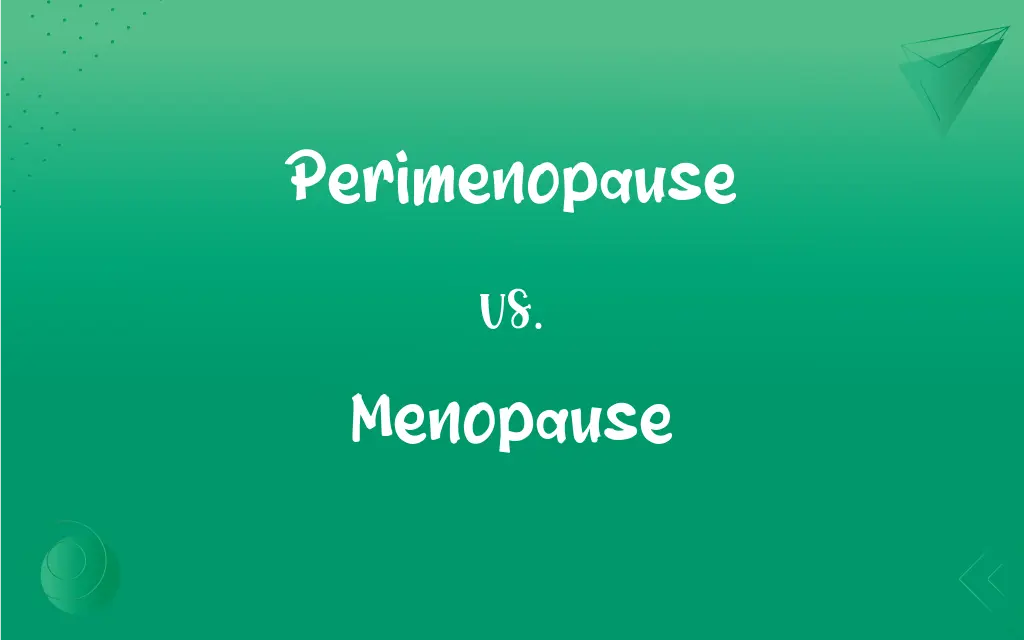Perimenopause vs. Menopause: What's the Difference?
Edited by Janet White || By Harlon Moss || Updated on October 27, 2023
Perimenopause is the transition phase before menopause marked by hormonal changes, while menopause is the point when a woman hasn't menstruated for 12 months.

Key Differences
Perimenopause is a transitional phase leading up to menopause, often starting in a woman’s 40s. It’s characterized by fluctuating hormone levels and irregular menstrual cycles. Menopause, on the other hand, is the point when a woman hasn't had a menstrual period for 12 consecutive months, marking the end of her reproductive years.
During perimenopause, women may experience symptoms like hot flashes, mood swings, and sleep disturbances due to hormonal fluctuations. Menopause is diagnosed retrospectively after a woman has gone 12 months without a period, and while some symptoms may persist, they often lessen in intensity.
Perimenopause can last several years, with estrogen and progesterone levels gradually declining. Menopause signifies a permanent cessation of menstrual cycles, indicating that the ovaries have stopped releasing eggs and producing most of their estrogen.
Treatment for perimenopause symptoms often includes lifestyle changes and sometimes hormone therapy. For menopause, treatment is usually aimed at managing symptoms and may also include hormone therapy or other medications.
It’s important to note that perimenopause is a natural aging process and not a medical condition. Similarly, menopause is a natural biological process and not a disease, but it marks the end of a woman's reproductive years.
ADVERTISEMENT
Comparison Chart
Definition
Transition phase before menopause
End of menstrual cycles for 12 months
Age of Onset
Typically in the 40s
Average age is 51 in the U.S.
Duration
Several years
Permanent
Hormone Levels
Fluctuating
Low and stable
Symptoms
Hot flashes, mood changes
Hot flashes, vaginal dryness
ADVERTISEMENT
Menstrual Cycle
Irregular
Absent
Reproductive Status
Decreasing fertility
No fertility
Treatment Focus
Symptom management
Symptom management, long-term health
Perimenopause and Menopause Definitions
Perimenopause
Pre-menopausal period with fluctuating estrogen levels.
Perimenopause often brings mood swings due to changing estrogen levels.
Menopause
Point marking end of ovarian function.
Menopause occurs when the ovaries no longer release eggs.
Perimenopause
Transition to menopause marked by hormonal changes.
She consulted her doctor about the hot flashes she was experiencing during perimenopause.
Menopause
Cessation of menstrual cycles for 12 months.
She celebrated a year without periods, marking her official menopause.
Perimenopause
Phase of irregular menstrual cycles before menopause.
Her perimenopause was characterized by increasingly erratic periods.
Menopause
End of reproductive ability in women.
Menopause signaled the end of her childbearing years.
Perimenopause
Stage leading to the end of reproductive years.
She attended a seminar to learn how to manage symptoms during perimenopause.
Menopause
Biological phase post-menstrual life.
Post-menopause, she focused on maintaining her bone health.
Perimenopause
Onset of menopausal transition symptoms.
The onset of night sweats indicated the beginning of perimenopause.
Menopause
Stage with permanent amenorrhea.
After reaching menopause, she no longer had to worry about menstrual cramps.
Perimenopause
The period of a woman's life characterized by physiological changes associated with the end of reproductive capacity, terminating with the completion of menopause. Also called climacteric.
Menopause
The permanent cessation of menstruation, usually occurring between the ages of 45 and 55.
Perimenopause
The physiological stage that women approaching menopause go through when, due to hormonal changes, they progress from their usual pattern of menstruation through a phase of atypical menstruation, and finally cease menstruating. Perimenopause ends when a woman has not menstruated for a year.
FAQs
What triggers perimenopause?
Perimenopause is triggered by natural hormonal changes as a woman ages.
Are hot flashes common in perimenopause?
Yes, hot flashes are a common symptom of perimenopause.
How long does perimenopause typically last?
Perimenopause can last from a few months to several years.
Can menopause cause weight gain?
Hormonal changes during menopause can lead to weight gain in some women.
What is the average age for reaching menopause?
The average age for menopause in the U.S. is around 51 years.
Can menopause affect mental health?
Yes, the hormonal changes during menopause can impact mental health in some women.
Can diet impact perimenopause symptoms?
Yes, a balanced diet can help manage some perimenopause symptoms.
Is menopause a medical condition?
No, menopause is a natural biological process, not a medical condition.
Can perimenopause symptoms be treated?
Yes, various treatments and lifestyle changes can help manage perimenopause symptoms.
Does everyone experience menopause the same way?
No, menopause symptoms and experiences can vary greatly among women.
Can perimenopause cause mood swings?
Yes, mood swings can occur due to hormonal fluctuations during perimenopause.
Is hormone replacement therapy (HRT) used for menopause?
Yes, HRT can be used to manage menopause symptoms, but it's not suitable for everyone.
What lifestyle changes can help with perimenopause symptoms?
Regular exercise, a healthy diet, and stress management can help manage perimenopause symptoms.
Can perimenopause cause sleep disturbances?
Yes, sleep disturbances are common during perimenopause due to hormonal changes.
Is it normal to have irregular periods during perimenopause?
Yes, irregular periods are a typical sign of perimenopause.
How does perimenopause differ from premature menopause?
Perimenopause is the natural transition to menopause, while premature menopause occurs before the age of 40 and is less common.
Is vaginal dryness a sign of menopause?
Yes, vaginal dryness is a common symptom of menopause due to decreased estrogen levels.
Can you get pregnant during perimenopause?
Yes, pregnancy is still possible during perimenopause, though fertility is declining.
Does menopause affect bone health?
Yes, menopause can lead to a decrease in bone density, increasing the risk of osteoporosis.
Are there natural remedies for menopause symptoms?
Some women find relief from menopause symptoms with natural remedies, but it’s important to consult a healthcare professional.
About Author
Written by
Harlon MossHarlon is a seasoned quality moderator and accomplished content writer for Difference Wiki. An alumnus of the prestigious University of California, he earned his degree in Computer Science. Leveraging his academic background, Harlon brings a meticulous and informed perspective to his work, ensuring content accuracy and excellence.
Edited by
Janet WhiteJanet White has been an esteemed writer and blogger for Difference Wiki. Holding a Master's degree in Science and Medical Journalism from the prestigious Boston University, she has consistently demonstrated her expertise and passion for her field. When she's not immersed in her work, Janet relishes her time exercising, delving into a good book, and cherishing moments with friends and family.
































































